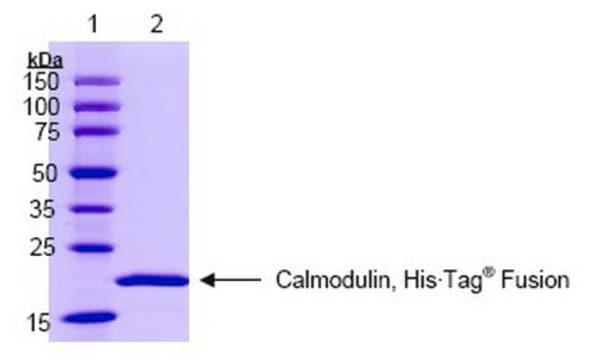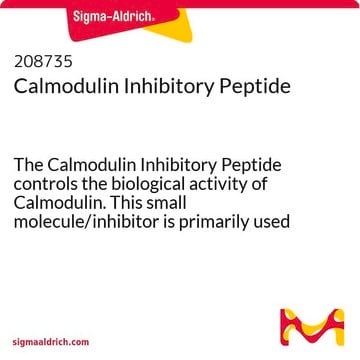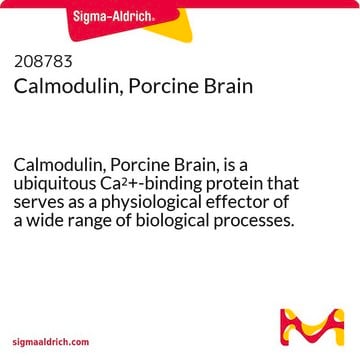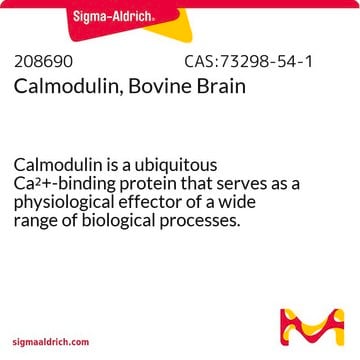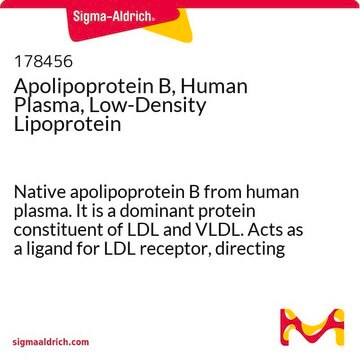208698-M
Calmodulin, Human Brain
Calmodulin, Human Brain, is a ubiquitous Ca2+-binding protein that serves as a physiological effector of a wide range of biological processes. Purified from human brain.
Sinónimos:
CaM, Ca 2+/Calmodulin, CaM, Ca2+/Calmodulin
Iniciar sesiónpara Ver la Fijación de precios por contrato y de la organización
About This Item
UNSPSC Code:
12352202
Productos recomendados
Quality Level
assay
≥95% (native PAGE)
form
lyophilized
manufacturer/tradename
Calbiochem®
storage condition
OK to freeze
storage temp.
−20°C
General description
Calmodulin purifed from human brain.
Calmodulin purifed from human brain. Calmodulin is a ubiquitous Ca2+-binding protein distributed in eukaryotic cells that serves as a major physiological effector for a wide range of cellular responses. The Ca2+-calmodulin complex is involved in the maintenance of intracellular Ca2+ homeostasis, as well as in the regulation of the intracellular concentration of other second messengers, such as cyclic AMP and inositol trisphosphate.
Warning
Toxicity: Standard Handling (A)
Unit Definition
One unit is defined as the amount of calmodulin that will give rise to 50% of the maximal enzyme activation of a standard level of activator-deficient 3ʹ,5ʹ-cyclic nucleotide phosphodiesterase.
Physical form
Lyophilized from protein solution with 2 mM EDTA.
Reconstitution
Reconstitute with distilled water. H₂O (1 mg/ml)
Other Notes
O′Neil, K.T., and DeGrado, W.F. 1990. Trends Pharmacol. Sci.15, 59.
Gopalakrishna, R., and Anderson, W.B. 1982. Biochem. Biophys. Res. Commun.104, 830.
Sharma, R.K., and Wang, J.H. 1979. Adv. Cyclic Nucleotide Res.10, 187.
Gopalakrishna, R., and Anderson, W.B. 1982. Biochem. Biophys. Res. Commun.104, 830.
Sharma, R.K., and Wang, J.H. 1979. Adv. Cyclic Nucleotide Res.10, 187.
Legal Information
CALBIOCHEM is a registered trademark of Merck KGaA, Darmstadt, Germany
Storage Class
11 - Combustible Solids
wgk_germany
WGK 1
flash_point_f
Not applicable
flash_point_c
Not applicable
Certificados de análisis (COA)
Busque Certificados de análisis (COA) introduciendo el número de lote del producto. Los números de lote se encuentran en la etiqueta del producto después de las palabras «Lot» o «Batch»
¿Ya tiene este producto?
Encuentre la documentación para los productos que ha comprado recientemente en la Biblioteca de documentos.
Nuestro equipo de científicos tiene experiencia en todas las áreas de investigación: Ciencias de la vida, Ciencia de los materiales, Síntesis química, Cromatografía, Analítica y muchas otras.
Póngase en contacto con el Servicio técnico
